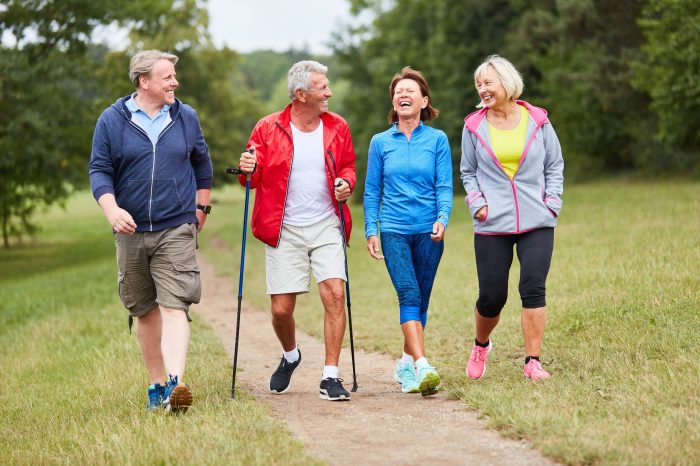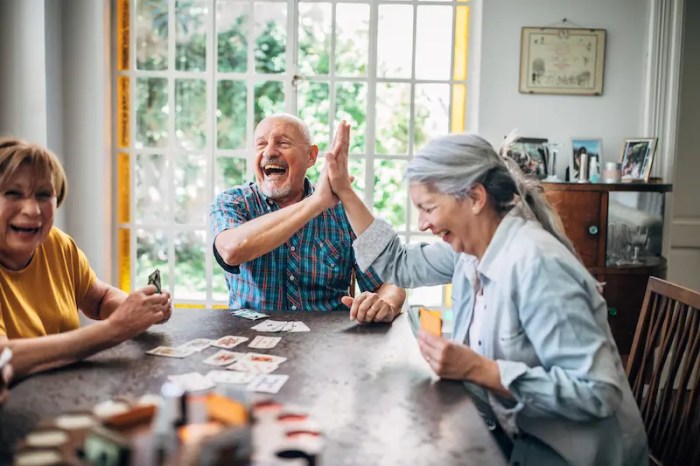Hobbies For Seniors: Active aging isn’t just about physical health; it’s about enriching life with engaging pursuits. From gentle exercise and creative expression to stimulating intellectual challenges and mindful relaxation, a diverse range of hobbies can significantly enhance the quality of life for older adults. This exploration delves into various options, offering a roadmap to a more fulfilling and vibrant later life.
The benefits extend far beyond simple enjoyment. Engaging in hobbies can combat loneliness, improve cognitive function, boost physical well-being, and foster a sense of purpose and accomplishment. Whether you’re seeking low-impact physical activities, creative outlets, social connections, or intellectual stimulation, there’s a hobby waiting to be discovered. This guide provides practical advice, resources, and inspiration to help seniors embark on a journey of enriching leisure pursuits.
Physical Hobbies for Seniors

Maintaining physical activity is crucial for seniors to preserve independence, improve cognitive function, and enhance overall well-being. Engaging in regular, age-appropriate exercise can significantly mitigate the effects of aging and contribute to a healthier, more fulfilling lifestyle. This section explores suitable physical hobbies for seniors, focusing on low-impact activities and accessibility considerations.
Low-Impact Exercises for Seniors
Choosing the right exercise is paramount. The following table categorizes low-impact exercises by intensity level, detailing their benefits and descriptions. Remember, individual needs vary, and consultation with a physician is always recommended before starting any new fitness regimen.
| Exercise Name | Intensity | Description | Benefits |
|---|---|---|---|
| Walking | Low | A simple, accessible activity involving a steady pace on a flat surface. | Improves cardiovascular health, strengthens leg muscles, and boosts mood. |
| Water Aerobics | Low to Moderate | Performing aerobic exercises in a pool, utilizing the buoyancy of water to reduce stress on joints. | Excellent cardiovascular workout with minimal joint impact, improves flexibility and range of motion. |
| Yoga | Low to Moderate | A practice involving stretching, breathing techniques, and meditation, promoting flexibility, balance, and relaxation. Chair yoga is a modified version for those with limited mobility. | Improves flexibility, balance, and reduces stress. Can also improve strength and range of motion. |
| Tai Chi | Low to Moderate | A gentle form of martial arts focusing on slow, flowing movements and deep breathing. | Improves balance, coordination, and flexibility. Can also reduce stress and improve mental clarity. |
| Cycling (Stationary or Outdoor) | Moderate | Riding a bicycle, either outdoors or on a stationary bike, provides a cardiovascular workout. | Improves cardiovascular health, strengthens leg muscles, and improves endurance. |
| Swimming | Moderate to High | Full-body workout with minimal joint impact due to water buoyancy. | Excellent cardiovascular exercise, improves muscle strength and endurance, and enhances flexibility. |
Adaptive Equipment for Seniors
Many seniors may benefit from adaptive equipment to participate more fully in physical activities. Examples include:* Walking canes and walkers: Provide stability and support for those with balance issues. These come in various designs to accommodate different needs and preferences. Some even incorporate features like seats for rest breaks.
Adjustable chairs
Allow seniors to maintain proper posture and support during exercises like chair yoga or stretching.
Resistance bands
Provide adjustable resistance for strength training exercises, accommodating varying levels of strength and mobility.
Water weights
Offer resistance in water aerobics, enhancing the workout intensity without putting excessive strain on joints.
Sample Weekly Exercise Plan
This plan incorporates three low-impact activities, emphasizing gradual progression and listening to one’s body. Remember to consult your physician before starting.| Day | Activity | Duration | Frequency ||———-|——————-|———-|————|| Monday | Walking | 30 minutes| 3 times/week || Wednesday| Yoga | 30 minutes| 2 times/week || Friday | Water Aerobics | 45 minutes| 2 times/week |
Importance of Consulting a Physician
Before embarking on any new exercise program, it is imperative to consult a physician or physical therapist. They can assess individual health conditions, identify potential risks, and recommend suitable exercises and modifications based on specific needs and limitations. This preventative step ensures safety and maximizes the benefits of physical activity while minimizing the risk of injury. Ignoring this crucial step could lead to health complications.
Social Hobbies for Seniors

Maintaining a vibrant social life is crucial for the well-being of older adults. Social interaction combats loneliness and isolation, significantly impacting both mental and physical health. Studies consistently demonstrate a strong correlation between social engagement and reduced risk of cognitive decline, depression, and cardiovascular disease. Engaging in social activities provides a sense of purpose, belonging, and boosts overall quality of life.
Social Groups and Clubs for Seniors
Numerous organizations and groups cater specifically to the interests and needs of seniors. These provide opportunities for connection and shared experiences. Examples include book clubs fostering intellectual stimulation and camaraderie through literary discussions; walking groups promoting physical activity and social interaction in a supportive environment; and volunteer organizations offering a sense of purpose and community engagement through contributing to a cause.
Other options might include crafting circles, bridge clubs, singing groups, or even groups centered around specific hobbies like gardening or photography. The key is finding an activity that aligns with individual interests and abilities.
Online versus In-Person Social Activities, Hobbies For Seniors
While both online and in-person social activities offer benefits, they cater to different needs and preferences. Online platforms, such as social media groups or online gaming communities, provide accessibility for those with mobility limitations or residing in geographically isolated areas. However, in-person interactions offer irreplaceable benefits, including non-verbal communication and the development of stronger, more meaningful relationships. The tactile element of human interaction, such as a friendly handshake or shared meal, cannot be replicated online.
The ideal approach is often a combination of both, leveraging the accessibility of online platforms to supplement the richness of in-person connections.
Creating a Flyer Advertising a Senior Social Gathering
A successful flyer should clearly communicate the event’s purpose, time, location, and benefits. Consider a visually appealing design using large, easy-to-read fonts and bright colors. Here’s a sample design concept: Headline: Connect, Create, and Thrive! Senior Social Gathering Image: A depiction of happy seniors engaged in a social activity, perhaps playing games, sharing a meal, or engaging in a craft project.
The image should be vibrant and welcoming, conveying a sense of fun and community. Body Text: Join us for an afternoon of fun, friendship, and engaging activities! Meet new people, share stories, and enjoy a lively atmosphere. Activities may include [list specific activities, e.g., board games, light exercise, conversation]. Refreshments will be provided. Date & Time: [Date and time of the gathering] Location: [Location of the gathering] Contact Information: [Phone number or email address] Benefits Highlighted: Combat loneliness, improve mental and physical health, meet new friends, and discover new interests.
Intellectual Hobbies for Seniors
Maintaining cognitive vitality is paramount as we age. Intellectual pursuits offer a powerful means of combating age-related cognitive decline and enriching the later years. Engaging the mind through stimulating activities promotes sharper thinking, enhanced memory, and a greater sense of purpose. This section explores a range of intellectual hobbies ideal for seniors, along with the resources and benefits they provide.
Intellectual Hobbies and Their Benefits
Lifelong learning is not merely a desirable trait; it’s a crucial element of healthy aging. Studies consistently demonstrate the positive correlation between cognitive engagement and reduced risk of age-related cognitive decline, including conditions such as dementia and Alzheimer’s disease. The stimulation provided by intellectual hobbies helps maintain neural pathways, strengthens cognitive reserve, and fosters a sense of accomplishment and self-efficacy.
Examples of Intellectual Hobbies for Seniors
The following table Artikels several intellectual pursuits suitable for seniors, detailing the resources available, the skills developed, and the associated benefits.
| Hobby | Resources | Skill Development | Benefits |
|---|---|---|---|
| Learning a New Language | Duolingo, Babbel, Rosetta Stone, local community colleges | Improved memory, enhanced cognitive flexibility, increased communication skills | Combats cognitive decline, expands social circles, enhances travel experiences |
| Reading | Local libraries, online bookstores (Amazon Kindle, etc.), book clubs | Improved vocabulary, enhanced comprehension, increased knowledge | Reduces stress, improves focus, stimulates imagination, fosters empathy |
| Puzzles (Sudoku, Crosswords, Jigsaw Puzzles) | Newspapers, puzzle books, online puzzle websites | Improved problem-solving skills, enhanced memory, improved concentration | Enhances cognitive function, provides mental stimulation, reduces boredom |
| Online Courses (Coursera, edX, Udemy) | Various online learning platforms offering courses on a wide range of subjects | Acquisition of new knowledge, improved critical thinking, enhanced digital literacy | Provides intellectual stimulation, fosters personal growth, expands knowledge base |
Online Resources for Senior Learning
Several online platforms cater specifically to the needs and interests of older adults. These platforms often feature user-friendly interfaces, accessible content formats, and a supportive learning community. Examples include:* Great Courses Plus: Offers a vast library of high-quality video lectures on a wide array of subjects.
The Great Courses Signature Collection
Similar to Great Courses Plus, but with a focus on in-depth exploration of specific topics.
OLLI (Osher Lifelong Learning Institutes)
A network of university-based programs offering non-credit courses for older adults. Many offer online options.
Brain-Training Games and Puzzles
Engaging in brain-training activities can significantly enhance various cognitive skills. The following list categorizes games and puzzles by the cognitive skills they improve:
Memory Enhancement
Memory Matching Games
These games require players to remember the location of cards or images.
Mnemonic Devices
Techniques like acronyms and imagery can be employed to improve memory recall.
Problem-Solving Skills
Logic Puzzles
These puzzles require deductive reasoning and analytical thinking to solve. Examples include Sudoku and KenKen.
Strategic Board Games
Games like chess and checkers require planning and strategic thinking.
Attention and Focus
Spot the Difference Games
These games require careful attention to detail to identify subtle differences between two images.
Concentration Exercises
Activities like mindfulness meditation can improve focus and attention span.
Ultimately, the key to successful aging lies in embracing a holistic approach that nurtures both physical and mental well-being. By actively pursuing hobbies tailored to individual interests and capabilities, seniors can unlock a world of opportunities for personal growth, social engagement, and lasting fulfillment. This exploration of hobbies for seniors underscores the importance of lifelong learning, social connection, and mindful self-care in creating a rich and rewarding retirement experience.

